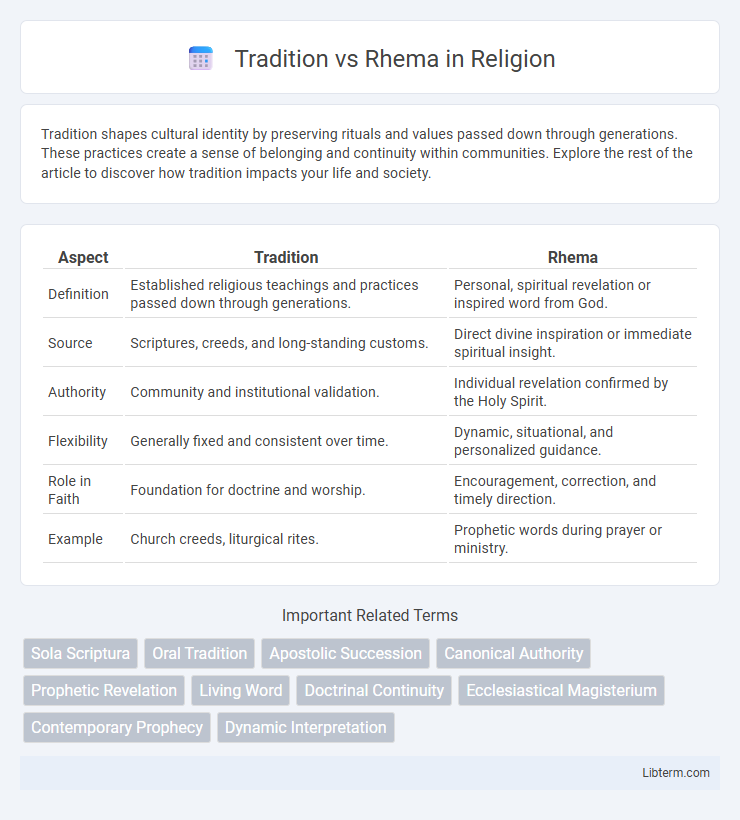Tradition shapes cultural identity by preserving rituals and values passed down through generations. These practices create a sense of belonging and continuity within communities. Explore the rest of the article to discover how tradition impacts your life and society.
Table of Comparison
| Aspect | Tradition | Rhema |
|---|---|---|
| Definition | Established religious teachings and practices passed down through generations. | Personal, spiritual revelation or inspired word from God. |
| Source | Scriptures, creeds, and long-standing customs. | Direct divine inspiration or immediate spiritual insight. |
| Authority | Community and institutional validation. | Individual revelation confirmed by the Holy Spirit. |
| Flexibility | Generally fixed and consistent over time. | Dynamic, situational, and personalized guidance. |
| Role in Faith | Foundation for doctrine and worship. | Encouragement, correction, and timely direction. |
| Example | Church creeds, liturgical rites. | Prophetic words during prayer or ministry. |
Understanding Tradition: Foundations and Influence
Tradition encompasses long-established customs and beliefs passed down through generations, providing a foundational framework for cultural and religious identity. It shapes collective memory and societal norms, influencing behavior and values by preserving historical continuity. Understanding tradition reveals its role in maintaining stability and guiding community practices across time.
Defining Rhema: The Living Word Explained
Rhema is defined as the living, dynamic word of God that speaks directly to an individual's heart and situation, revealing specific guidance beyond general scriptural principles. Unlike Tradition, which emphasizes established doctrines and long-held interpretations, Rhema involves personal revelation inspired by the Holy Spirit's immediate communication. This concept highlights a fresh, timely word that transforms faith through direct divine interaction.
Historical Perspectives: Tradition Through the Ages
Tradition has shaped religious and cultural practices by transmitting established beliefs and rituals across generations, often serving as a foundational framework for communal identity. Historically, traditions have evolved through interpretations by religious leaders and scholars, embedding collective wisdom and continuity within societies. This ongoing interplay between inherited customs and contextual understanding highlights the dynamic nature of tradition as both preservation and adaptation in various historical epochs.
Rhema in Contemporary Faith Practices
Rhema in contemporary faith practices emphasizes the personal, direct revelation from God, offering believers immediate and specific guidance that transcends traditional scripture. This concept enables dynamic spiritual experiences where individuals perceive God's voice in everyday situations, fostering a more intimate and active faith life. Rhema contrasts with tradition by prioritizing living revelation over established doctrines, encouraging believers to rely on current divine communication.
The Tension Between Tradition and Rhema
The tension between Tradition and Rhema reflects the dynamic interplay between established doctrines and immediate, Spirit-led revelations within Christian practice. Tradition represents the accumulated theological interpretations and liturgical practices passed through generations, while Rhema emphasizes personalized, situational insights believed to be direct utterances from God. Navigating this tension requires balancing respect for historical continuity with openness to fresh divine guidance, often shaping individual and communal faith responses.
Authority and Relevance: Which Should Lead?
Authority in Tradition stems from longstanding teachings and established doctrines that provide stability and continuity within religious communities. Rhema, as a personal or immediate word from God, offers relevance by addressing specific, contemporary situations with direct spiritual insight. Balancing Tradition's authoritative foundation with Rhema's contextual adaptability ensures that faith remains both grounded and dynamically relevant.
Impact on Worship and Spiritual Life
Tradition establishes structured worship practices that provide continuity and communal identity, fostering a sense of stability and shared belief among congregants. Rhema, or the spoken word by the Spirit, introduces dynamic and personal revelations that invigorate spiritual life, encouraging intimacy with God and immediate responsiveness. Balancing tradition with Rhema enhances worship by blending historical faith expressions with fresh, Spirit-led insights, creating a vibrant and transformative spiritual experience.
Navigating Conflicts: Practical Approaches
Navigating conflicts between Tradition and Rhema requires discerning the balance between established doctrines and the fresh, Spirit-led revelations that guide personal faith. Practical approaches include prayerful reflection, seeking wise counsel within the faith community, and testing new revelations against scriptural truths to ensure alignment with core biblical principles. Emphasizing humility and open dialogue fosters unity while respecting the dynamic nature of spiritual understanding.
Testimonies and Experiences: Voices from Both Sides
Testimonies and experiences reveal that Tradition emphasizes the continuity of established doctrines passed down through generations, often grounding faith in historical interpretations and communal consistency. Rhema highlights personal encounters and timely revelations believed to be direct communications from God, underscoring the dynamic and individualized nature of spiritual experience. Voices from both sides reflect a deep commitment to faith, with Tradition valuing collective wisdom and Rhema prioritizing immediate, personal inspiration.
Embracing Balance: Integrating Tradition and Rhema
Embracing balance between Tradition and Rhema fosters a dynamic spiritual journey where time-honored teachings coexist with fresh, inspired revelations. Integrating scriptural authority with personal, Spirit-led insights enriches faith, allowing believers to stay rooted while remaining open to divine guidance. This harmony empowers individuals and communities to adapt growth and resilience without compromising foundational truths.
Tradition Infographic

 libterm.com
libterm.com